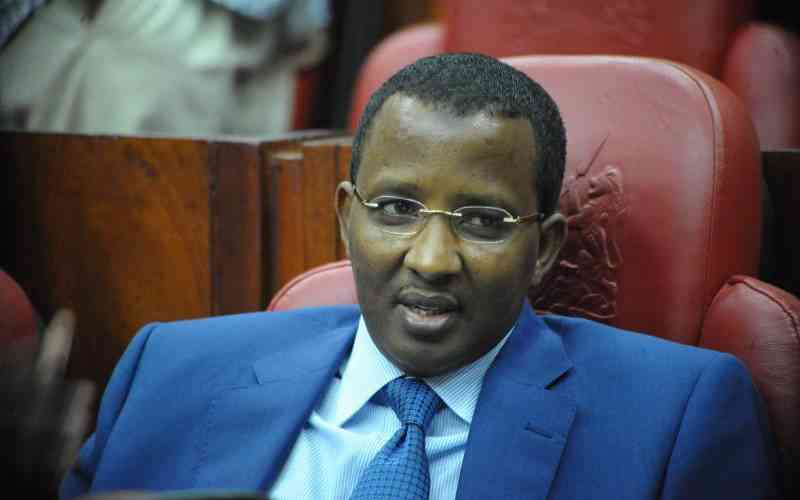
Mr Murkomen made the revelation after his recent weeklong visit to Beijing, where he affirmed Kenya's bilateral relations with China at a time the West has increased its dalliance with the Ruto regime.
"Through our partnership, we hope to complete our ongoing road projects, extend the railway to Malaba, dual our main highways, expand our port and airports' infrastructure, equip our technical and vocational institutions, build water dams, implement our smart and intelligent traffic systems among others," said Mr Murkomen.
"Our meetings precede President William Ruto's visit soon to China to meet with his counterpart President Xi Jinping."
The Financial Standard could not immediately reach Xi's office and State House on details of the planned visit.
The Financial Standard has learned that Beijing is keen to dislodge Kenya's allies again in bagging crucial deals including the construction of a new Sh160 billion toll highway from Nairobi to Mau Summit, which has since stalled, and the extension of the Chinese-built Standard Gauge Railway (SGR) to Malaba, near the Uganda border.
Such deals would benefit Chinese firms such as China Road and Bridge Corporation which built a section of the SGR but also the Nairobi Expressway on a public-private partnership basis.
The Mau Summit highway had been expected to begin months ago after Kenya signed a commercial agreement with French consortium Vinci.
It stalled after the new administration took power.
Kenya, a critical US ally in the East Africa region, has for decades been under pressure from Washington to resist the push for stronger military and economic ties with China, which has been seeking greater influence in the region.
Keenly watched
China has lent Kenya and other African countries hundreds of billions of dollars as part of President Xi Jinping's Belt and Road Initiative (BRI), which envisaged Chinese institutions financing the bulk of infrastructure in mainly developing nations.
Ruto's maiden visit to Beijing will be keenly watched by diplomatic observers. The expected visit to Beijing would also mark the President's U-turn on his earlier rhetoric against Chinese loans.
China is Kenya's largest bilateral lender and has financed infrastructure projects from railways to highways.
But during the presidential campaign, Chinese lending became a major political issue, with Ruto amplifying the rhetoric by blaming those loans for Kenya's debt and economic crisis troubles.
Stay informed. Subscribe to our newsletter
The hybrid look East-West policy would, however, fit in with a pattern similar to the former regime of President Uhurur Kenyatta which also tapped Beijing to fund the construction of new infrastructure projects.
During his recent visit, Murkomen singled out expansion in Kenya-China relations on infrastructure as a priority for the Kenya Kwanza administration.
"For the last three days, I held consultative meetings in Beijing, China, with various leaders including HE Li Xiaopeng, Minister of Transport and Deng Li, Vice Minister of Foreign Affairs of the People's Republic of China; Tan Wenhong, the Deputy Director General of the China International Development Cooperation Agency and Wang Weidong Executive Vice President of China Development Bank," the CS said, extolling the virtues of collaborating with Beijing.
"Our discussions were centred on strengthening our bilateral development cooperation and comprehensive strategic partnership between our two countries even as we celebrate 60 years of diplomatic relations."
At the height of the seemingly strained relations with Beijing, Murkomen last November released loan documents related to the SGR that Uhuru's regime fought in the courts to keep secret.
The publication of the agreements for $3 billion of loans honoured Ruto's campaign promise to bring more transparency to dealings between Nairobi and Beijing, which some in Kenya blame for bogging the country down in debt.
China's BRI has been praised by supporters for providing vital financing to infrastructure-starved countries. Critics, including the United States, say the initiative is overloading poor nations like Kenya with debt.
 The Standard Group Plc is a
multi-media organization with investments in media platforms spanning newspaper
print operations, television, radio broadcasting, digital and online services. The
Standard Group is recognized as a leading multi-media house in Kenya with a key
influence in matters of national and international interest.
The Standard Group Plc is a
multi-media organization with investments in media platforms spanning newspaper
print operations, television, radio broadcasting, digital and online services. The
Standard Group is recognized as a leading multi-media house in Kenya with a key
influence in matters of national and international interest.
 The Standard Group Plc is a
multi-media organization with investments in media platforms spanning newspaper
print operations, television, radio broadcasting, digital and online services. The
Standard Group is recognized as a leading multi-media house in Kenya with a key
influence in matters of national and international interest.
The Standard Group Plc is a
multi-media organization with investments in media platforms spanning newspaper
print operations, television, radio broadcasting, digital and online services. The
Standard Group is recognized as a leading multi-media house in Kenya with a key
influence in matters of national and international interest.





